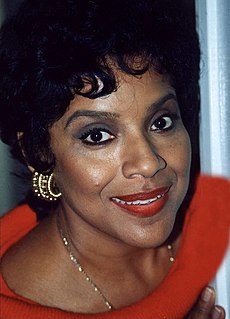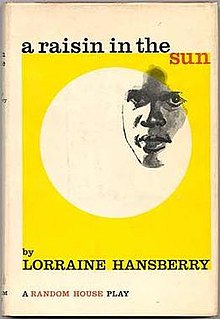Related Research Articles

Lorraine Vivian Hansberry was a playwright and writer. She was the first African-American female author to have a play performed on Broadway. Her best known work, the play A Raisin in the Sun, highlights the lives of Black Americans living under racial segregation in Chicago. The title of the play was taken from the poem "Harlem" by Langston Hughes: "What happens to a dream deferred? Does it dry up like a raisin in the sun?" At the age of 29, she won the New York Drama Critics' Circle Award — making her the first African-American dramatist, the fifth woman, and the youngest playwright to do so. Hansberry's family had struggled against segregation, challenging a restrictive covenant in the 1940 US Supreme Court case Hansberry v. Lee.

Ralph David Carter is an American actor and singer best remembered as Michael Evans, the youngest child of Florida and James Evans, Sr., on the CBS sitcom Good Times from 1974–1979. Before joining Good Times, Carter appeared in the Broadway musical Raisin, based on the Lorraine Hansberry drama A Raisin in the Sun; as was noted in the credits during the first season.

Phylicia Rashād is an American actress, singer and stage director. She is known for her role as Clair Huxtable on the NBC sitcom The Cosby Show (1984–92) which earned her Emmy Award nominations in 1985 and 1986. She was dubbed "The Mother Of The Black Community" at the 2010 NAACP Image Awards and played Ruth Lucas on Cosby (1996-2000).

Raisin is a musical with music by Judd Woldin, lyrics by Robert Brittan, and a book by Robert Nemiroff and Charlotte Zaltzberg. It is an adaptation of the Lorraine Hansberry play A Raisin in the Sun; the musical's book was co-written by Hansberry's husband, Robert Nemiroff.

Joseph Stein was an American playwright best known for writing the books for such musicals as Fiddler on the Roof and Zorba.

Boris Aronson was an American scenic designer for Broadway and Yiddish theatre. He won the Tony Award for Scenic Design six times in his career.
Shauneille Perry is an American stage director and playwright. She was one of the first African-American women to direct off-Broadway.

Eliza "Virginia" Capers was an American actress. She won the Tony Award for Best Lead Actress in a Musical in 1974 for her performance as Lena Younger in Raisin, a musical version of Lorraine Hansberry's play A Raisin in the Sun.
Philip Rose was a Broadway theatrical producer of such productions as A Raisin in the Sun, The Owl and the Pussycat, Does a Tiger Wear a Necktie?, Purlie, and Shenandoah. His work was particularly notable for its social insight and distinctive social conscience.

Diana Patricia Sands was an American actress, perhaps most known for her portrayal of Beneatha Younger, the sister of Sidney Poitier's character in the original stage and film versions of Lorraine Hansberry's A Raisin in the Sun (1961).

Claudia McNeil was an American actress known for premiering the role of matriarch Lena Younger in both the stage and screen productions of A Raisin in the Sun.

Zalmen Mlotek is an American conductor, pianist, musical arranger, accompanist, composer, and the Artistic Director of the National Yiddish Theatre Folksbiene (NYTF), the longest continuous running Yiddish theatre in the world. He is an internationally recognized authority on Yiddish folk and theater music and a leading figure in the Jewish theatre and concert worlds. As the Artistic Director of the NYTF for the past twenty years, Mlotek helped revive Yiddish classics, instituted bi-lingual simultaneous English and Russian supertitles at all performances and brought leading creative artists of television, theatre and film, such as Itzhak Perlman, Mandy Patinkin, Sheldon Harnick, Theo Bikel, Ron Rifkin, and Joel Grey, to the Yiddish stage. His vision has propelled classics including NYTF productions of the world premiere of Isaac Bashevis Singer's Yentl in Yiddish (1998), Di Yam Gazlonim and the 1923 Rumshinky operetta, The Golden Bride (2016), which was nominated for a Drama Desk Award and listed as a New York Times Critics Pick. During his tenure at the NYTF, the theatre company has been nominated for over ten Drama Desk Awards, four Lucille Lortel Awards, and has been nominated for three Tony Awards. In 2015, he was listed as one of the Forward 50 by The Forward, which features American Jews who have had a profound impact on the American Jewish community.
Judd Woldin was an American composer, most notable for his musical Raisin.

A Raisin in the Sun is a tragedy by Lorraine Hansberry that debuted on Broadway in 1959. The title comes from the poem "Harlem" by Langston Hughes. The story tells of a Black family's experiences in south Chicago, as they attempt to improve their financial circumstances with an insurance payout following the death of the father. The New York Drama Critics' Circle named it the best play of 1959, and in recent years publications such as The Independent and Time Out have listed it among the best plays ever written.

Julius Adler was a Jewish-American actor, writer, and director in Yiddish theater.
A Raisin in the Sun is a play by Lorraine Hansberry that debuted on Broadway in 1959.

Kristen Anderson-Lopez is an American songwriter and lyricist known for co-writing the songs for the 2013 computer animated musical film Frozen with her husband Robert Lopez. Anderson-Lopez won the Academy Award for Best Original Song for "Let It Go" from Frozen and "Remember Me" from Coco (2017) at the 86th Academy Awards and 90th Academy Awards. She also won two Grammy Awards at the 57th Annual Grammy Awards.
To Be Young, Gifted and Black: Lorraine Hansberry in her Own Words, is a play about the life of American writer Lorraine Hansberry, adapted from her own writings. Hansberry was best known for her 1959 play A Raisin in the Sun, the first show on Broadway written by an African-American woman. After her death in 1965, Hansberry's ex-husband and friend, songwriter and poet Robert Nemiroff, collated her unpublished writings and adapted them into a stage play that first ran from 1968 to 1969 off Broadway. It was then converted into an equally successful autobiography with the same title.
Robert B. Nemiroff was an American theater producer and songwriter, and the husband of Lorraine Hansberry.
Fiddler: A Miracle of Miracles, released May, 9th 2019, is an American documentary film about the creation and significance of the 1964 musical Fiddler on the Roof. Directed by Max Lewkowicz, it features interviews with Fiddler creators such as Jerry Bock, Sheldon Harnick, Joseph Stein, and Harold Prince, as well as scholars, actors, and other musical theatre figures such as Stephen Sondheim and Lin-Manuel Miranda.The documentary includes rarely-seen footage of the original Broadway cast as well as interviews with creators, actors, theatrical figures, and scholars.
References
- 1 2 3 4 5 6 7 8 9 Greenberg, Shoshana. "Searching for Charlotte Zaltzberg: the Legacy of a Lost Female Writer". The Interval. Retrieved June 24, 2017.
- ↑ Barnes, Clive (October 19, 1973). "Theater: Raisin in Musical Form" (PDF). New York Times.
- ↑ "Mrs. Zaltzberg, 49; Raisin Co-Author". The New York Times. February 25, 1974. Retrieved January 24, 2017.